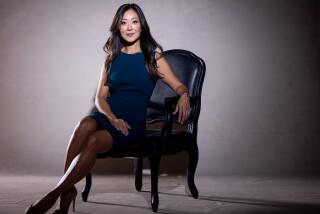Woo Stand, Bank’s Practices Differ : Mayoral race: Candidate touts plan to use Asian capital for inner city. But bank with ties to his family has made no home loans to blacks in two years. He says he has no influence over such matters.
- Share via
As he crisscrosses Los Angeles, mayoral candidate Michael Woo is touting a proposal to boost minority community investment through a consortium of Asian-American and African-American financial institutions that could pool loan capital.
Woo offers the plan as an example of his creative leadership, and has made it a cornerstone of his economic program and his appeal to minority voters, particularly African-Americans.
Woo, a Los Angeles city councilman for nearly eight years, said that he has done little to encourage loans to African-Americans and Latinos by a Chinatown-based bank with long ties to himself and his family.
Cathay Bank--where Woo’s late grandfather and now his father have been officers for decades, where Woo held stock until last year and where executives have helped raise thousands of dollars for his current campaign--has not made a home loan to an African-American in the past two years, The Times has found.
More than 97% of Cathay’s home loans in 1991--the most recent year for which complete figures are available--went to Asian-Americans. Most were relatively well-to-do, despite the bank’s ethnically and economically diverse market area, including central Los Angeles and the western San Gabriel Valley, records show.
One of 121 home loans was made to Latinos--who account for up to 65% of the population in the bank’s core service area. None were made to African-Americans, who make up 8% of the population in the bank’s main branch service area.
The bank defends its record, saying that despite efforts to attract non-Asian-American applicants, it received no home loan applications from African-Americans in 1991 and 1992, and only 11 from Latinos. However, advocates pushing banks to diversify their lending base say such arguments are often heard from institutions that manage to improve their records when legally challenged.
Woo’s father, Wilbur K. Woo, who has loaned or donated more than $200,000 to his son’s various City Hall campaigns, heads the Cathay Bank committee responsible for complying with federal lending regulations that require banks to reach out to ethnic groups.
In an interview, Michael Woo said that Cathay needs to do better, and said it is participating in his fledgling consortium, which he hopes to finalize and launch in the spring. But he said he has not previously involved himself in the bank’s practices, though he authored a city commendation of the bank.
“I don’t discuss Cathay business with my dad,” Woo said. “It’s not my business. I don’t work there. I’m not involved with them.”
Woo never has been an officer of the bank, and his once-removed relationship to Cathay raises the difficult question of how much politicians can be held accountable for the actions of their close relatives. In this case, Woo has invited scrutiny because he is selling himself as the candidate most committed to bridging the gap between Asian banking capital and Los Angeles’ urban economic ills.
“I believe there are ways a leader can make the private sector be interested in doing things they wouldn’t otherwise do,” Woo said at a recent fund-raiser, citing his plan as evidence of his ability to get “the private sector to do something to address an urgent need.”
“Where was he two years ago?” asked Carlton Jenkins, managing director of black-owned Founders Bank. “It is a fair question to raise given he’s running for mayor and given he’s making (Asian bank investment in the inner city) a cornerstone issue.”
Jenkins has worked with Woo on the proposed banking consortium and praises the councilman for a genuine commitment to a promising concept. Most Asian-American banks have shown little investment interest in the inner-city, Jenkins said.
Woo has attempted to distance himself from the bank, selling his Cathay stock, worth an estimated $70,000, before entering the mayoral race. Yet the matter clearly poses a dilemma for the candidate.
Taking a hands-off approach, he has risked indirect blame for the practices of the institution. Yet he would have exposed himself to criticism had he taken too active a role in the bank, which does business with the city--a sensitive matter given the scandal involving Mayor Tom Bradley and local financial institutions.
Wilbur Woo said the bank’s record is a good one. Some African-Americans have received business loans, he said, although that lending data is not publicly available. He added that ads have been placed in ethnic newspapers and postcards mailed to minority neighborhoods.
But Cathay’s record drew criticism from activists who have challenged allegedly discriminatory lending practices of other banks. “They don’t reflect L.A. at all,” said Bob Gnaizda, legal counsel for the Greenlining Coalition, a union of consumer groups.
He said Cathay’s home lending record to non-Asian minorities appears to be worse than that of Sumitomo Bank, which last year agreed to an extensive package of institutional reforms and outreach programs in the face of a legal challenge by his coalition.
A federal government audit of Cathay’s compliance with lending regulations is being completed, but results are not yet publicly available, said officials at the Federal Deposit Insurance Corp. Imbalances between the demographic and economic makeup of a bank’s market area and its lending record are a concern to examiners, although not automatically a cause for poor ratings, said Bob Carmona, an FDIC supervisor who oversees Los Angeles.
Wilbur Woo predicted that Cathay would pass the federal review with “flying colors.”
Cathay Bank has received multimillion dollar deposits from the city Community Redevelopment Agency and the county Transportation Commission.
Recently, the city has moved to prohibit deposits in banks with poor minority lending records, but the rating system to evaluate banks has not been developed.
Michael Woo said he supports the spirit of such efforts, but declined to say whether a bank such as Cathay--which makes many loans to members of one minority group, Asian-Americans--should be permitted to continue receiving city deposits.
The mayor and council set policy for city deposits but do not get involved on a case-by-case basis.
Woo has won official praise for Cathay Bank’s business practices. In 1987, to mark the bank’s 25th anniversary, he authored a City Council commendation saying that Cathay Bank had “rigorously pursued an ‘open door for all’ policy and has developed strong relationships with ‘non-Chinese’ customers.”
Despite Woo’s efforts to publicly steer clear of Cathay, interviews show that the bank’s executives have been quietly helping raise thousands of dollars in contributions to Woo’s campaign.
Cathay Bank President Dunson Cheng said in an interview that he had contacted up to 20 potential donors, including customers of the bank. Also, Cathay’s first vice president, James P. Lin, was master of ceremonies at a Woo fund-raiser in Chinatown that brought in at least several thousand dollars.
Both said they were aiding Woo as individuals, and the bank was not involved.
More to Read
Sign up for Essential California
The most important California stories and recommendations in your inbox every morning.
You may occasionally receive promotional content from the Los Angeles Times.













